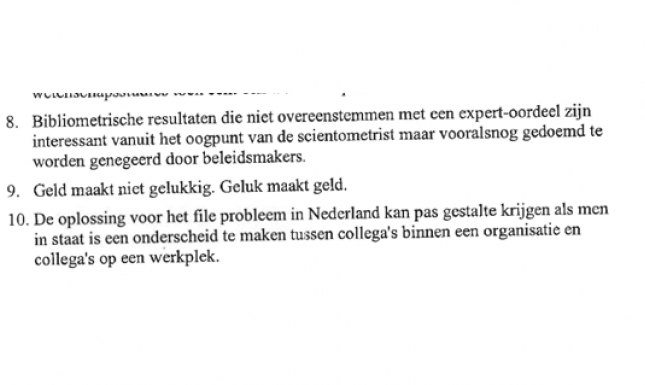Going back to normal?
With Covid-19 forcing university staff to work from home, there is ample opportunity for rethinking all the commuting we were doing in ‘normal' times. However, staying all at home is not so enjoyable, either. Could there be an alternative?
This blogpost is a follow-up of the post by Carole de Bordes. She discusses a pre-covid19 workshop she attended on virtual meetings and conferences.
Due to the Covid-19 crisis, we are currently experiencing a new way of working at CWTS. All staff needs to work from home. And besides the difficulties some colleagues are facing in this transition because of their home situations, most of the normal work could be taken up quite fast again. The main factor is the type of work we do, of course. A university research institute with hardly any teaching tasks can manage almost all things remotely. On top of that, we have excellent ICT facilities and staff to guide us in this process.
In early April 2020, the Dutch prime minister warned us that it will be a long way back to the life before the outbreak. This statement, in particular, made me think about the way CWTS may adapt to this situation. We are able to deal with the current situation, but would we be fit to enter a new way of working in the longer term? On the other hand, I actually consider the current course of affairs to hold an opportunity.
At present, all CWTS staff works from home. The university has appropriate facilities for almost all of us to stay in our homes and do the job we are supposed to do. We access data from a distance, we have online meetings and online conferences, we can write and share texts, etc. In that sense, we hardly need an office in Leiden. Commuting has become obsolete.
Does this mean we can continue in this way once the crisis is over? Is working from home the new ‘normal’ to us? Obviously not. For many of us, working from home is complicated, due to housing issues. You don’t want to work all the time in the place where you eat, watch television, or sleep. And maybe even more importantly, we miss the social contacts in real life. CWTS café at 10 AM staring at a screen does not make up for that.
But there is an alternative that deserves consideration. In 1999, I defended my PhD thesis in Leiden. In the Netherlands, PhD candidates are supposed to add a separate leaflet to their dissertation which includes 10 theses (stellingen in Dutch), relating to the subject or the candidate. The list I handed in at the time included one particular thesis, the last one, which has remained unnoticed to many but may hint to the opportunity for a new ‘normal’.


Reducing commuting issues by traveling less
The snapshot above shows the bottom of the list of theses. The last one, number 10, states (in English):
The solution for traffic jams in the Netherlands can only be reached if we are able to make a distinction between colleagues within the organization and those in one’s working place.
In other words: to reduce the problem of traffic jams, we should have offices near staff members’ residences, hosting people from different organizations or companies. Such offices are what my colleague Carole de Bordes has referred to as (meeting) hubs. With people living in many other places than Leiden, we could have such hubs. This would significantly reduce the commuting of our staff. We would not only contribute to less contact with fellow travelers but also save many, many hours sitting in a train (or car). I am not saying that traveling time is lost time but after more than thirty years of commuting between Utrecht and Leiden, I do consider over 12,000 hours a bit silly. Thinking of all the things I could have done during that time…
On top of that, it will be easier to accommodate the 1.5-meter distance policy with fewer people in the office at the same time.
What is the proposition?
For instance, currently, five CWTS staff members live in Utrecht. They could take up quarters in an office with a proper infrastructure during the week, and travel only to Leiden when they need to be there physically. Many meetings and talks could be done via online-conferencing. For the rest, meeting in these hubs would offer the possibility of not having to work from our living rooms or bedrooms anymore and enable us to socialize with colleagues. In fact, the one thing we are most desperately missing at the moment is meeting colleagues in person during breaks and in the hall, all those informal encounters. With hubs in Utrecht, Amsterdam or Rotterdam, though, this would be covered. We could cover the extra costs of having these hubs by saving traveling costs or with support from the faculty, which will also save expenses when the building is used less. Considering the lack of office space at the university, this would be beneficial as well.
Finally, the above proposition will lead to a more convenient way of working. This will contribute to happiness. And happiness is the key value to success, as stated in thesis number 9:
Money does not make [you] happy. It is happiness that makes money.



0 Comments
Add a comment